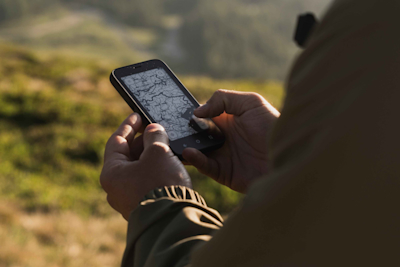
You Have Permission to be Offline
You have permission to be offline.
You have a right to be offline.
You have been allowed to turn off your phone, ignore your notifications, calls and texts.
Do you?
What’s stopping you?
Ask yourself why you don’t, then if you’d like to, attempt to change your habits.
When was the last time you switched off?
By ‘switched off’, we mean, when was the last time you completely disconnected and did something offline? For some people, let’s call them ‘Group A’, this isn’t a problem, they can remove themselves from their devices and simply do things without them.
They can go for dinner or to a movie without their phone, they can jog without a music player, read a book without the TV on etc. Group A understands the concept of JOMO (the joy of missing out).
For others, let’s call them ‘Group B’, this simply isn’t the case. There are those who go through life documenting every moment rather than simply living it or those who miss every moment because they’re too busy scrolling, tapping, browsing and snapping. Group B live their lives through the concept of FOMO (the fear of missing out).
This blog post is intended to help Group B understand why they spend so much time online and how they can combat this. Members of Group A who are still reading, try to help those from Group B achieve the balance you’ve found between offline and online.
Which group of people do you identify with? Group A (mainly offline) or Group B (mainly online). You can also learn more about JOMO and FOMO here.
Try not to worry about what other people think.
We often tend to worry about what other people think when we want people to like us. It’s the most common, normal and natural thing in the world. We are inherently designed to want to fit in. This ‘need to belong’ is an intrinsic motivation, it is part of human nature and our behaviour is largely affected by this.
However, since becoming more connected than ever before, the audience of people we’re worried about has grown. It’s not simply a case of neighbours, friends and relatives. Now we can add strangers, old neighbours, old friends and distant relatives to that list too.
We’ve written a list of ways you can start to let people know you’d like to spend more time offline. If you don’t update your Instagram story every day, we promise no one will mind but just in case they do, you can try one of the following tips:
Openly voice your concerns (online or offline) about the amount of time you spend online. If you’re using a time tracker such as the Screen Time feature in an iPhone (or iPad), show people how much time you spend online.
Let people know that you intend to spend less time online. This could be as a Facebook or LinkedIn post, YouTube video, status update, Instagram post or story, tweet, wherever you waste the most time, that’s where people might miss you the most.
In the words of Nir Eyal, companies need to “build time to disconnect into their company culture”, this also applies to the cultures of friendships, families, schools, universities etc. If we don’t always feel the need to be constantly online, we can start to enjoy life offline.
You could even get people from your online world to meet up in the offline world. That way you can all benefit! If you spend all day talking to your colleagues on Slack (particularly if you work remotely), it’s a nice idea to meet them in real life (IRL) from time to time.
If you have close family and friends who get frustrated when you don’t reply quickly enough, it’s important to communicate that you need time for yourself. If people care about you, they will respect your boundaries.
Think about the ways you’d rather spend your time. Let’s say you spend 30 minutes a day on Facebook or another social media platform, what will you do instead? Prepare yourself to do something else.
Read about other people’s experiences, try to learn from them. We have two posts which might help: 72 Hours Offline: A Digital Detox Experience and I went 24 hours without my phone and here’s what happened.
Photo by Ivy Son from Pexels
You’ve let everyone know you’re going offline, now what?
You’re almost ready to spend more time offline. Everyone knows that you’re about to disconnect, they’ll miss seeing the photos of your lunch, the videos of your gym sessions, the tweets and statuses about how much you like your pet, your job and so on but you’ll survive, they’ll survive too. This is why it’s important to think about how you’ll spend all of this time you’ve suddenly acquired. What do you do next?
We have a list of ideas for activities you can do both online and offline on our blog. 30 Offline Hobbies to Try Outdoors and 30 Offline Hobbies to Try Indoors. It might be worth noting them down into a journal or onto a piece of paper so that you can come back to them with you switch off.
If there are hobbies which require you to buy some new equipment, that can be a fun offline experience too. Rather than purchasing online, try taking a trip to a real life shopping mall, local shop or market to find the items you need. Make it part one of your offline adventure.
Get other people involved. You can take people with you on your journey or you can meet people when you get there. If you’ve decided to take up a new hobby, particularly a sport or exercise class, there will always be other people in the same boat as you. Talk to them, ask people how long they’ve been doing the hobby, explain to them why you decided to do it. Learn from each other, help each other and keep up the great work!
To further support your journey towards digital minimalism, consider the new Mudita Kompakt mindful phone. Our device is designed with simplicity in mind, offering essential features without the distractions of a typical smartphone. With its e-ink display and extended battery life, Mudita Kompakt encourages you to stay connected to the world around you while minimizing screen time. By limiting notifications and unnecessary app access, this phone helps you embrace the offline lifestyle, making it easier to focus on meaningful activities and real-life interactions.
Don’t give up, even when it gets difficult.
It can be very easy to give up, log in and sign up. This can happen when we rely too much on what goes on online, we start to forget how to live offline.
Although it may feel as though a part of you is missing, it isn’t. It may also take far more time to break up with your phone or laptop than you expected. When you feel like going online, it might be a good idea to ask yourself ‘why?’ and remember that you have permission to be offline. Taking notes when you want to go online can be useful too, understanding your own emotions and the reasons behind your choices and behaviors can help you grow as a person.
There are some very simple things that you can do to combat the desire to switch on again:
Water your plant(s) or garden. If you don’t have either, maybe someone else’s plant(s) or garden could do with some water.
Clean or tidy your house/apartment/car/boat or even your desk.
Organize a meeting with your family, friends or colleagues and spend time with them.
Draw, paint or write something.
Play a musical instrument (if you can), try to play one or make one out of household items if you can’t or don’t have one (it might sound childish but it could be quite fun).
Take your pet for a walk, play with your pet, give your pet food or water. If you don’t have a pet, you could do any of those things for someone else’s pet (with their permission).
Go outside, for a walk (or roll if you’re in a wheelchair), regardless of the weather! Even if only for a couple of minutes. Getting some fresh air can help you feel better.
Sometimes, we might want to go online to feel less isolated but it might be better under such circumstances to try a meetup.com group where you can meet like-minded people offline instead. There are a lot of communities that exist both online and offline. Even if it takes some time, you might eventually find one that suits you.
We also have several articles you might like if you’re struggling with device overuse or you’re simply interested in spending more time offline, here are four to get you started:
Is there anything you’d like to add, have we missed anything?
We’d love to know what you think. If you’re interested in sharing your experiences with us or writing a guest post for us, send us an email via hello@mudita.com!
Please feel free to get in touch via social media (send us some photos or videos too), you can find us on Facebook, Twitter and Instagram, let’s connect! To learn more about Mudita, take a look at our website and our other posts. If you enjoyed reading this article, please share and recommend it! We need to go online to find people who’d like to spend more time offline.
Related stories

News for Our N. American Backers: Kompakt is Shipping Next Week!
Mudita Kompakt is shipping to North America! Get the latest updates on delivery, tariffs address deadlines, and our commitment to our North American Backers.

What is a digital detox?
Discover what a digital detox is, why it matters, and how unplugging can boost sleep, reduce stress, and help you reconnect with what really matters.

Traveling with Mudita Kompakt & the Joy of Intentional Travel
Traveling with Mudita Kompakt proved that digital minimalism works. No distractions, effortless boarding passes & an impressive battery life. Read all about it!
If you'd like to receive the best stories from our blog, keep up to date with our progress and get notified about our product releases and special discounts.